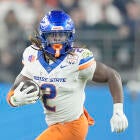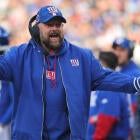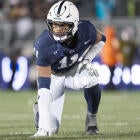After having Justin Tucker experiment with a new type of kickoff earlier this year, the Ravens won't be allowed to utilize their new kick anymore, and that's because it has now been deemed illegal by the NFL.
Ravens coach John Harbaugh raised some eyebrows back in Week 3 when he sent Tucker out in a clear onside kick situation during Baltimore's game against Kansas City. With 2:01 left to play, and the Ravens trailing 33-28, the Chiefs thought an onside kick was coming, but instead, Tucker hit them with a surprise dropkick.
JUSTIN TUCKER BROKE OUT THE DROPKICK FOR HIS ONSIDE ATTEMPT
— Christian D'Andrea (@TrainIsland) September 22, 2019
(it did not work) pic.twitter.com/Xcb2S6bjSx
Although the Ravens didn't recover the onside dropkick, one aspect of the play did work out in their favor. When the Chiefs fielded the kick, they called for a fair catch, which means no time ran off the clock. With 2:01 remaining, that means the Chiefs had to run a play before the two-minute warning, which basically gave the Ravens an extra timeout. If the Chiefs had fielded the ball, the clock would have run down to the two-minute warning, and the game would have been all but over because Baltimore only had one timeout left.
It was a smart strategy, but you won't be seeing it ever again, and that's because the NFL has banned it. In a recent interview, Harbaugh explained that the league office let him know that the Ravens will no longer be allowed to use the kick, even though the team had been cleared to use it against the Chiefs.
"We talked to [the league office], we explained exactly what we were doing and how it was going to go, and they said it was legal, we could do it," Harbaugh said, via the Ravens' Twitter account. "We talked to the officials before the game. They called the league office, again. They had been in contact with the league office, the officiating office, and they said it was legal."
In the weeks after the game, the league apparently decided it didn't like what it saw on the field.
"Probably, the competition committee decided they didn't want to see it," Harbaugh said. "Someone on the competition committee -- probably the chairman [Falcons president Rich McKay] -- decided with [senior vice president of officiating] Alberto [Riveron] they didn't want to see it, so now, it's not legal. So, that's pretty much how it works, and how it worked in this case."
In a statement to Pro Football Talk, the NFL insinuated that the kick was never legal at all.
"By definition, a drop kick is a kick by a player who drops the ball and kicks it as, or immediately after, it touches the ground. If that does not happen, the play should be shut down and a flag thrown for a false start," the league office said.
Of course, that definition is pretty vague. If the player has to kick the ball "immediately after" the ball hits the ground, you could argue that Tucker did that with his dropkick. The Ravens kicker made contact with the ball less than 0.7 seconds after it hit the ground, which is pretty immediate.
"Dropkick is defined the way it's defined," Harbaugh said.
The Ravens coach insists the league approved the kick and he doesn't seem to have any idea why the NFL changed its mind on the matter.
"Just to be clear about that, and I think it's really important to understand this: We were in contact with the league officiating office all the way through," Harbaugh said. "We didn't just pull it out, and decide to try it, and sneak it past them."
Even though Harbaugh feels the play was legal, he won't be allowed to use it anymore since it's against NFL rules, but that doesn't mean we won't be seeing anymore crazy plays from Harbaugh. Before being hired as coach of the Ravens, Harbaugh spent 20 years coaching special teams at both the college and pro levels, which is one reason why he's always looking for any advantage he can get in that phase of the game, so don't be surprised if you see an onside punt or something like it in Baltimore's next game.
![[object Object] Logo](https://sportshub.cbsistatic.com/i/2020/04/22/e9ceb731-8b3f-4c60-98fe-090ab66a2997/screen-shot-2020-04-22-at-11-04-56-am.png)



















